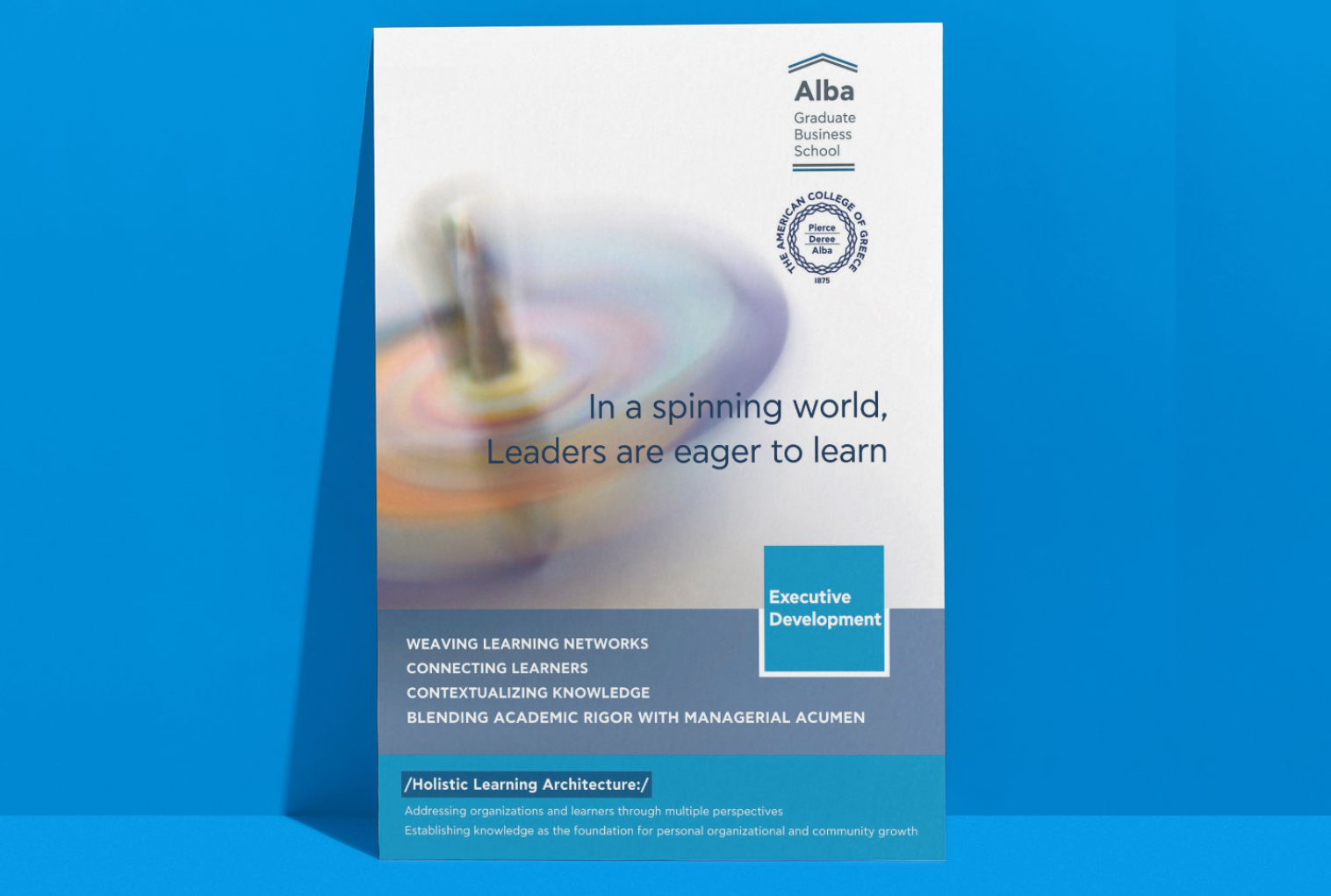.jpg)
On Tuesday evening, leaders from business, education, and policy gathered at Alba Graduate Business School for a pivotal discussion on the future of work and learning in the era of artificial intelligence. Part of the Lead Creatively Discussion Series hosted by the SEV Center of Excellence in Creative Leadership, the event featured keynote speaker Sarah Toms, Chief Innovation Officer at IMD and co-founder of Wharton Interactive, in a fireside chat with Professor Nikos Mylonopoulos, Director of the SEV Center.
.jpg)
Opening the evening, Dora Economou, Director of Human Capital Affairs at SEV, set the tone with a call to action. While AI is redefining what’s possible, she argued, “creative leadership decides what’s meaningful.” Economou highlighted a stark national challenge: despite growing demand, only 6% of Greek companies have fully integrated AI, and the talent pipeline remains critically underdeveloped. “Talent shortage is no longer a future threat—it’s a present constraint on growth and innovation,” she warned.
.jpg)
In response, SEV and Alba are co-developing a suite of free, high-impact AI learning programs—bootcamps, workshops, and hands-on business case labs—designed not only to build technical proficiency but to cultivate strategic and ethical capabilities across diverse industries.
Professor Kostas Axarloglou, Dean of Alba, took the stage to frame the broader societal shift. Referencing Race Against the Machine, he noted that previous waves of technology changed skills. Today, he said, “technology changes the very essence of learning—and of being human.” For Axarloglou, failing to adapt to AI is not just a matter of losing competitiveness; it risks marginalization from the evolving social fabric. “Learning is the DNA of humankind,” he said. “Those who don’t engage with this transformation may be left out—not just from the job market, but from life.”
.jpg)
Professor Nikos Mylonopoulos, Director of the SEV Center of Excellence in Creative Leadership, positioned the evening’s conversation as a response to this moment of inflection. Drawing a parallel to the rise of MOOCs a decade earlier, he noted: “Artificial intelligence is now doing for executive learning what MOOCs did for access—but on a far larger, faster scale.” As organizations confront rapid disruption, he emphasized the need to rethink how leaders learn, grow, and make meaning. “As algorithms take over routine tasks,” he said, “the human edge—our judgment, creativity, and emotional intelligence—becomes the new strategic battleground.”
.jpg)
Taking the stage, Sarah Toms shared IMD’s rapid evolution from “no Zoom account in 2020” to becoming a leading innovator in AI-powered executive education. Within six weeks, IMD launched its first generative AI tools, enabling learners to interact with course content through conversational agents and carry their classroom experience forward long after programs end. “Learning is no longer linear,” she explained. “It’s atomic, personalized, and continuous.”
Toms described IMD’s initiatives like Thrive with IMD and its in-house “AI engine room,” where agents support individualized reflection, capability mapping, and real-time learning reinforcement. “AI is removing the bullshit work from our jobs,” she said. “Now we need to raise our game as humans.”
But Toms was equally emphatic that GenAI is not simply a productivity enhancer—it is a strategic and ethical frontier. “We drafted our AI principles before ‘Responsible AI’ became a buzzword,” she noted. “Transparency, privacy, and truth are non-negotiable. You can’t outsource ethics to the algorithm.”
.jpg)
Audience questions opened up deeper reflections on ethics, education, sustainability, and inclusion. On the environmental toll of large models, Toms didn’t hold back: “Training GPT-3.5 consumed 750,000 gallons of fresh water. Sustainability must be part of your GenAI strategy.” She called for a shift toward smaller, fine-tuned models and better integration of older, efficient technologies where appropriate. “Not every question needs a giant model,” she said. “Use a database. Save the planet.”
Asked what single skill future workers must master, her answer was clear: the ability to learn—and unlearn. “AI makes every job a leadership job,” she observed. “Everyone will need to coach, direct, and course-correct machine outputs.”
.jpg)
In a conversation with an education official, Toms stressed the need to introduce leadership and ethical thinking into school curricula. “This isn’t a calculator—it’s a co-worker,” she said. “That means kids need leadership training by age 10.” She urged policymakers to view AI as a moment to double down on what makes us human: ethics, creativity, judgment, and agency.
Institutional transformation was also top of mind. Toms pointed to Gen Z’s shifting expectations around purpose and flexibility, warning that traditional firm structures may need to evolve. “They don’t aspire to 30-year careers,” she said. “If your organization doesn’t adapt, you won’t attract the next wave of talent.”
The discussion closed with a powerful reflection from the audience: how do we ensure inclusivity in this AI revolution? Toms responded by sharing her work with HerHack—a national initiative in Switzerland to bring women into tech. “Women aren’t late to AI,” she said. “They’re waiting for permission. And we must stop making them wait.”
.jpg)
The event concluded with a shared sense that while AI may accelerate change, it is leadership—ethical, creative, and human-centered—that will determine its long-term impact.
“GenAI is not just a tech upgrade,” Toms reminded the audience. “It’s a leadership imperative—and a test of your institution’s capacity to adapt.”
.jpg)
You can watch the recording of the event below
.jpg)




